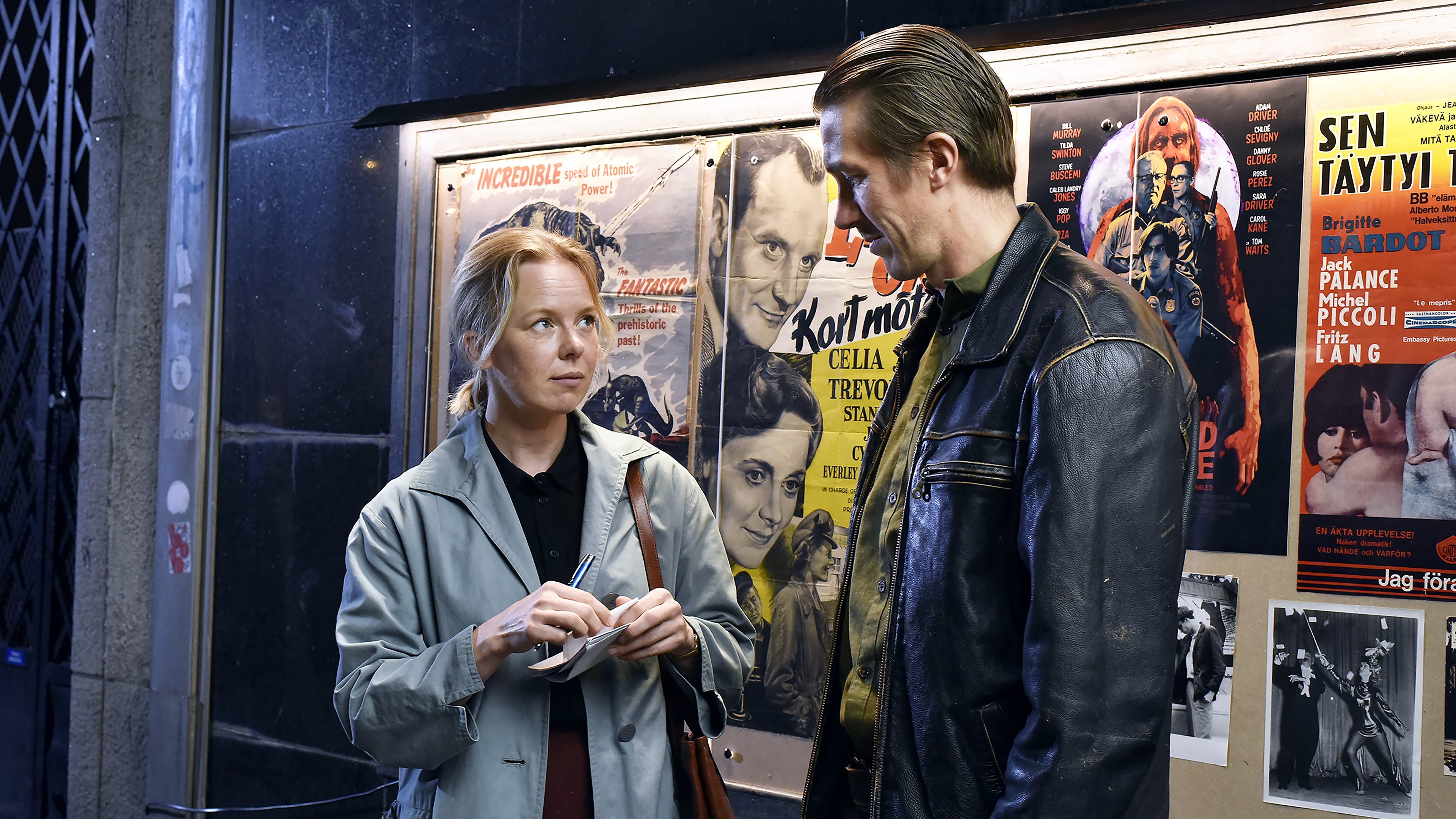
CinemaSerf@Geronimo1967
There's a lovely scene in this film where "Holappa" (Jussi Vatanen) and his mate are in an Helsinki karaoke bar staffed by a motionless barman who looks like he's straight out a zombie movie! Talking of zombie movies, the story follows the lives of this fellow and of "Ansa" (Alma Pöysti) whose first date at the local "Ritz" cinema is ecactly that - unlikely fodder for a burgeoning romance - even if their post film chat afterwards is under the gaze of a "Brief Encounter" poster. She has recently been fired for pinching some out-of-date food from the supermarket in which she worked. He's been fired a few times for too many vodka breaks at work. Her latest boss is arrested for drug dealing and that's when they first meet. They click, they go for a coffee - then that cinema trip ensues. Thing is, she has views on excessive drinking - it has profoundly affected members of her family. He's a bit of an ass about that - but perhaps she's had more of an impact on him than he realised. Maybe he can give up? Maybe she'll give him another chance? The humour here is plentiful but really quite dark and subtle. There are plot developments that we probably ought not to laugh at, but we do - and the ending leaves us hoping but not knowing. It's not exactly laugh out loud but you'll get plenty to smile about if you keep your wits about you for eighty minutes. Perhaps not a film the Finnish Culture Ministry would be too fond of - but I enjoyed it.
Brent Marchant@Brent_Marchant
It’s not much of a secret that the worldview of Finnish society can be more than a little bleak. At the same time, though, it also possesses an understatedly campy, eminently whimsical quality that comes in stark contrast to this otherwise-dour outlook. And this makes for a combination of traits that can be somewhat puzzling to fathom, especially to outsiders. That’s the quirky social conundrum that writer-director Aki Kaurismäki seeks to capture in his latest offering, a wry comedy-drama focused on the lives of two lonely, lovelorn working class Helsinki residents (Alma Pöysti, Jussi Vatanen) who struggle against life’s hiccups while seeking to forge a romance. But, in telling their story, the filmmaker has difficulty finding sufficient traction to engage viewers. We witness a story full of modest, garden variety ups and downs, as well as more than a few miscommunications, experiences we’ve all no doubt undergone ourselves from time to time. However, is that enough to make a compelling picture? It certainly doesn’t feel that way much of the time, given its wooden dialogue and restrained, sometimes-stilted performances, no matter how pointedly this production may portray the nature of this extraordinarily reserved people. To its credit, the film works best when it pokes fun at the nature of Finnish culture, providing some delicious nuggets of droll humor, backed by a diverse yet spot-on soundtrack that fittingly and ironically complements what’s unfolding on screen. Nevertheless, there’s so much here that lends so little to a narrative that just never catches fire that it’s hard to imagine almost anyone generating any interest in, or enthusiasm for, the protagonists and their feeble attempts at launching a relationship. Maybe I’m missing something here, but, if there is something meaningful that this release is trying to convey, it’s apparently well buried under one of those big piles of fallen leaves that give this picture its title.
BornKnight@BornKnight
German-Finnish drama / romance by the director Aki Kaurismäki, continuation of his Proletariat series, which was originally planned as a trilogy and already includes Shadows in Paradise (1986), Ariel (1988), and The Match Factory Girl (1990).
With simple stories in a stylized Helsinki that seems to be stopped at the end of the 80´s on purpose (although your hear on the radio about the current Russia and Ukraine War, and see a 2024 calendar) it tells about the love story in simple lines of melancholy about two workers, a construction area man and a woman that worked on supermarkets and factories. Think of a Finnish Wes Anderson.
The lines of the story are simple as the concept, of a couple that have some mismatches around the way till the final encounter, but this simpliness, slow-paced sweetness in the context of the depression and melancholy of the lives and city is what colours the film in the end. Contributing to this sweetness it includes the changes on each other character along the movie in simple steps.
The movie premiered on 76th Cannes Film Festival, and was selected to compete for the Palme d'Or in its main competition section, where it won the Jury Prize and will be the contender for the 96th Academy award for best international movie.
Knowing what to expect of the movie I gave him a 7,6 out of 10,0 score, or a B+ as I always prefer more complex stories.
badelf@badelf
I want to say that "Fallen Leaves" and Wong Kar-wai's "In The Mood For Love" trilogy are both treating the identical theme - the challenges of love. Except that, even though the theme is the same, these two films exist in entirely different universes. Not even parallel universes, LOL!
The first half of Aki Kaurismäki's presentation was side-splitting, stand-up, visual comedy. The typical dead-pan humor had sparse, but sufficient, dialog, and was delightfully sardonic. It was paced so well, and the leads excelled at the style, that by the time the third act came around, I had just become aware of how much I was invested in the story and characters.
The real difference between the Fin's and the Hong-Konger's entry to the love challenge is the Weltanschauung. In Fallen Leaves, we are guided to a more hopeful, positive universe. It's easy to see why this film was a Cannes favorite.

